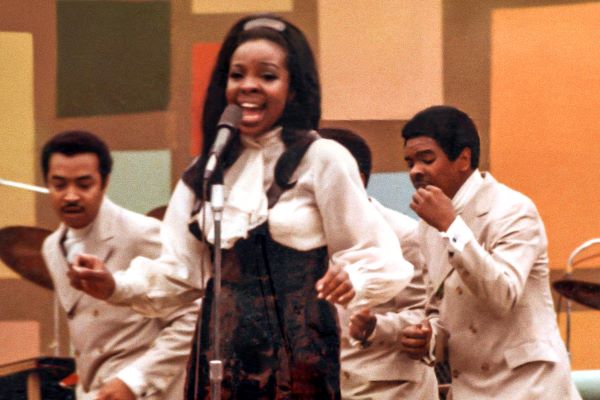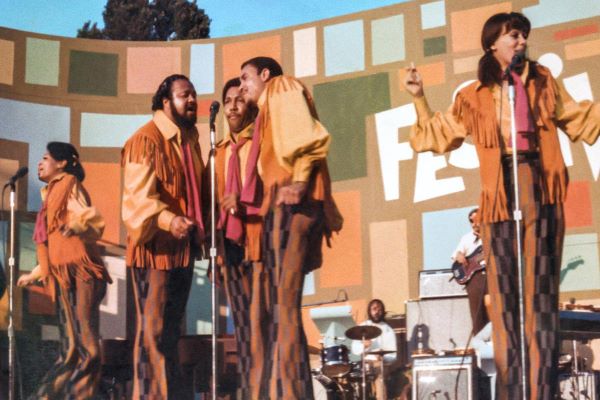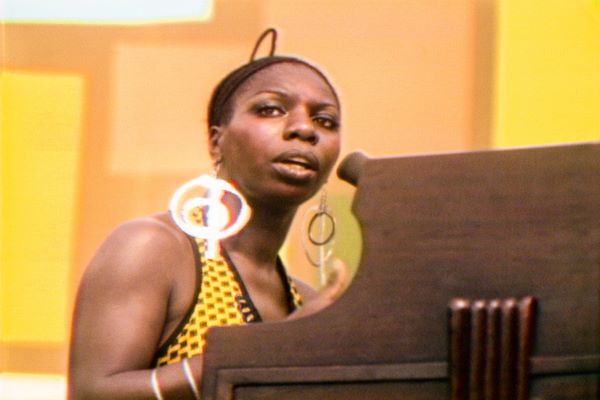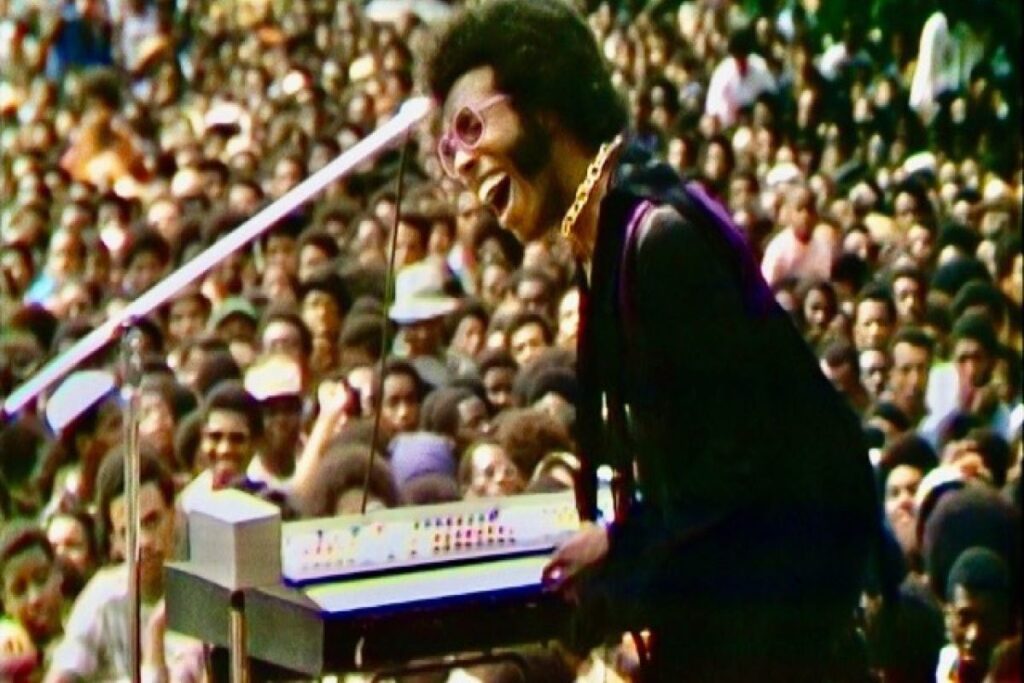1969 and contemporary time periods are reflected in Ahmir “Questlove” Thompson’s concert documentary Summer of Soul (….Or, When the Revolution Could Not Be Televised). A piece of art is nothing but a piece of life. So, it is quite obvious that art always reflects life. Contemporary social, economic, political, and cultural conditions are reflected through an artist’s work. Questlove’s concert documentary Summer of Soul (….Or, When the Revolution Could Not Be Televised) is based on the 1969 Harlem Cultural Festival which was organized at Mount Morris Park in Harlem, New York. The festival was organized during the same tumultuous decade when John F. Kennedy, Malcolm X, Robert F. Kennedy, and Dr. Martin Luther King Jr. were assassinated. Many famous musicians performed at this event and all of them reflected the contemporary time. The struggle, pain, trauma, and suffering of black people were reflected through their music. They showed their strongest support to the civil rights movement against racial discrimination not only in America but all over the world. Moreover, they also sang songs of hope, liberation, and freedom. For the first time in history, the word “Negro” was replaced with the word “Black”. Amidst mourning and oppression of black people, they showed the way of a new era and affirmed – yes we can!
One of the most important art events organized amidst the civil rights movement in the United States is Harlem Cultural Festival. The festival was organized in 1969 over six Sundays in Mount Morris Park, Harlem, New York. There was no entry fee for the festival and 300000 people attended it. Concerts by multiple famous musicians were organized as part of the festival. It also included speeches by religious leaders, activists, and comedy shows. The musicians who performed at the event were Stevie Wonder, The Chambers Brothers, B..B. King, Herbie Mann, 5th Dimension, Edwin Hawkins Singers, Pops Staples and the Staple Singers, Mahalia Jackson, David Ruffin, Gladys Knight & the Pips, Sly and the Family Stone, Mongo Santamaria, Ray Barretto, Sonny Sharrock, Max Roach, Abbey Lincoln, Hugh Masekela, and Nina Simone. Religious Leader and activist Jesse Jackson delivered a speech in support of the civil rights movement. There were also comedy shows by Willie Tyler & Lester and Moms Mabley. Tony Lawrence was the host and producer of the festival. He had great connections in New York City. The then Mayor of New York City John V Lindsay, who was very popular in the black community and carried out multiple anti-poverty and education programs, attended the event. Organizing a series of events with 300000 attendees and so many famous musicians was a mammoth task altogether.

Black Panther Party provided security for the entire festival and Maxwell Household Coffee was the advertising brand and sponsor. As there was no lighting arrangement, the artists performed facing the Sun. The venue was so jam-packed that people even sat on the trees. They came with their families and made the venue look like a family outing. People were selling food, toys, and balloons just outside the park. One of the festival attendees, Musa Jackson, recounts it as an ultimate black barbeque, and it smelled like afro sheen and chicken. Festival producer and director Hal Tulchin filmed the events that turned out to be footage of over forty hours. He tried to sell this referring to it as “Black Woodstock”, but unfortunately, he did not get any buyers for this event. Apart from two one-hour television shows, one on CBS and the other on ABC channels in 1969, the footage was kept in the basement of a building for over fifty years until Questlove was approached for making Summer of Soul (….Or, When the Revolution Could Not Be Televised). The destiny is that the contemporary musical event Woodstock organized in the city of Woodstock 100 miles away from Harlem became a big hit, whereas the footage of the Harlem Cultural Festival was kept in the basement and its impact never saw the daylight.
The struggle, trauma, and oppression of black and colored people were reflected in the music and performances of the musicians and speeches of the religious leaders. They all grew up and lived amidst injustices and racial discrimination. The majority of the black and colored population lived under punishing poverty, unemployment, lack of education, and drug addiction. Harlem was not an exception. Black citizens did not have voting rights and were not considered for jobs. There was a disproportionate allocation of black soldiers on the frontline during the infamous Vietnam War. Under such extreme circumstances of suffering, it was quite obvious that the oppressed citizens would raise their voices and protest against all those injustices. The musicians showed their strongest support for the civil rights movement. However, this protest and sentiment were not restricted only to the black people and the United States, the language of protest and revolution spread across the entire world. The musicians who performed at the Harlem Cultural Festival showed their unconditional support towards all the oppressed and racially discriminated people that including Jamaican, Black Panamanian, Cuban, Puerto Rican, Latin, African, and Asian.

The musicians who performed at the Harlem Cultural Festival echoed not only the language of mourning and protest but also the sentiment of hope and enthusiasm. Amidst the darkness, they sang the song – “Let the Sunshine In”. They dreamt of a new world, which will be based on equality, justice, and progress. Black America found solace in the Gospels which worked as a therapy for the stress and trauma they had undergone each day. Great Gospel singers like Mahalia Jackson echoed the same sentiment against discrimination and in support of the civil rights movement. Their music showed that the voice of the beloved Lord is filled with love, peace, and non-violence. The most important and basic principle of the religious leader and great civil rights activist Dr. Martin Luther King Jr. was non-violence. Nina Simone had an exceptional voice, which was filled with both mourning and hope. These great artists showed ordinary citizens how to march on amidst the greatest of difficulties. The atmosphere of the festival and the emotion of the general public were – “Yes we can. This is a new world. This is our world.”
Humans were able to set their feet on the moon for the very first time in history on 21st July 1969. Neil Armstrong famously said – “That’s one small step for man, one giant leap for mankind.” However, black America was hardly interested in that. When they were undergoing pain, struggle, troubles, and suffering like poverty, lack of education, drug addiction, unemployment, and health problems, it was quite obvious that they would not be interested in the moon landing. When a person’s basic survival is uncertain, scientific progress appears to be a mirage. A human cannot exist in this world without the basic necessities of life. As Fred Hampton pronounced that black America has lost hope in this country. Musician Ray Barreto said that we have to be together in this world and not on the Moon. Comedians mocked the moon landing. Even though the moon landing was a major contemporary event of the Harlem Cultural Festival in 1969, it failed to garner enthusiasm amongst black Americans, and rightfully so.

One of the most important aspects of this film is extremely dynamic and efficient editing. It adds an extra dimension to the film. The way enthusiasm amongst rich and elite white Americans and frustrations amongst poor black Americans were coupled during the time of the moon landing is brilliant and praiseworthy. So many events have been covered and described in the film brilliantly through the interviews of festival attendees like Musa Jackson, Dorinda Drake, Barbara Bland-Acosta, Ethel Beatty, Darryl Lewis, Charlayne Hunter-Gault, and musicians like Marilyn McCoo, Billy Davis Jr., Stevie Wonder, Mavis Staples, Gladys Knight, and religious leaders and activists like Reverend Jesse Jackson and Reverend Al Sharpton. Summer of Soul won Grand Jury Prize and Audience Awards for Best Documentary at the 2021 Sundance Film Festival. It won Best Documentary Feature at the 94th Academy Awards and Best Documentary at the 75th BAFTA Awards. It has received widespread critical acclaim and won many awards all over the world.
